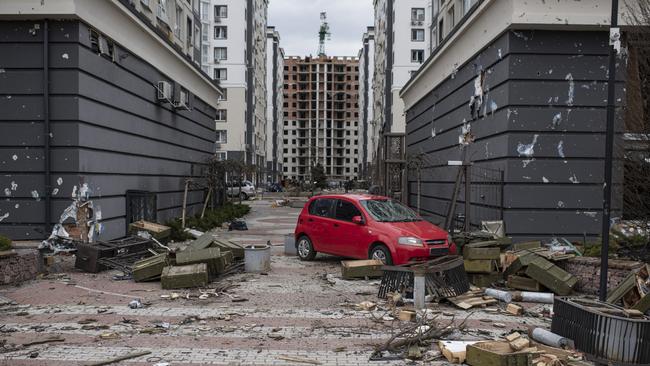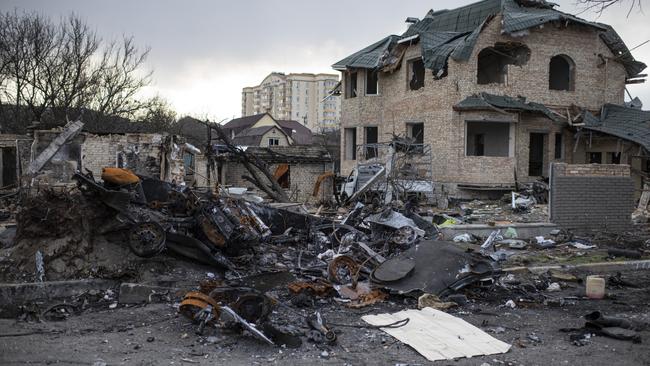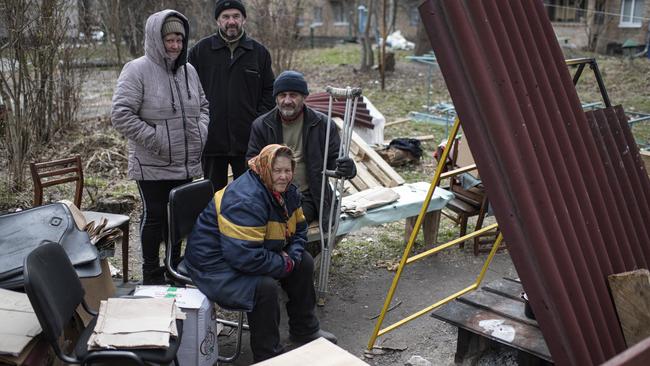Russian brutality in Ukrainian town of Bucha
Resident Vladislav Kozlovsky has given an insight into the terror that consumed the town of Bucha during last month’s Russian occupation.

“They shot in the head or the heart,’’ says a witness describing the horrific actions of Russian soldiers occupying Bucha, which included torturing people who tried to escape.
Vladislav Kozlovsky has told of the brutal experience of being in Bucha, the home of his mother and grandmother, when the Russians rolled into the affluent town outside Kyiv on March 2.
World leaders have been shocked at the barbarity of the civilian massacres in the town; so far the death toll stands at 420, with many more in surrounding towns.
Ukraine President Volodymyr Zelensky was angered and overwhelmed at the viciousness of the atrocities when he walked the streets of Bucha on Monday.
Wearing a bullet proof vest, he said: “These are war crimes and will be recognised by the world as genocide.”
US President Joe Biden labelled Russian dictator Vladimir Putin a war criminal and said there should be a war crimes trial.
Retreating Russian troops had left dozens of bodies of residents laying on the streets, some shot in the back of the head with their hands tied behind their backs.
But in one of the first-hand accounts of what went on inside the town during the near month-long Russian occupation, Mr Kozlovsky has given an insight into the terror that consumed the town in an interview with social media platform Vot-Tak.
“I was near the headquarters of the Bucha territorial defence with several friends. Everyone who did not have weapons was ordered to hide in a bomb shelter near the base,” he told Vot-Tak.

“The shelter was protected by two doors. The invaders knocked out the first one, and we opened the second one ourselves because we understood that they would break in anyway and then they could simply kill everyone. Among the attackers were mostly Russians and Belarusians, they are easy to recognise by their characteristic dialect.”
Mr Kozlovsky, a sommelier who had been working in Kyiv until war broke out, said the Russian forces treated the residents well for the first few days but no one was allowed out of the bunker.
“We sat in absolute darkness. There was no light, water or heat, of course. Then these military men were replaced by others. On March 7 they brought out of the bunker firstly the women with children, and then the men.”
Mr Kozlovsky then described how the men were ordered to their knees and they were stripped of all their belongings as the Russians said they were looking for Nazis. His watch and money were stolen.
Then they checked documents and people’s tattoos and if they were registered in the Ukraine defence forces they were immediately shot. Men who had fought in the eastern Ukraine hostilities since 2014 were also executed, as were people with a tattoo of the Ukrainian coat of arms.
“They shot either in the back of the head or in the heart,” he said.
Mr Kozlovsky believed that eight men were killed this way because “yesterday I saw their bodies behind a stone building in a pile of things in one of the photos from Bucha”.
“For me, it was all in a fog, it was scary, and I was sure that I would never return home,” he said.
“My friend, who had nothing found, was shot in the side and told, ‘this is so that you are not in a hurry to go home’. I was interrogated about where Ukraine veterans or nationalists live, but I did not know anything and could not answer. As a result, I was severely beaten and hit on the head with a rifle butt.”

Mr Kozlovsky said that after a few weeks of occupation, Chechen fighters entered Bucha and the killings escalated. His neighbour, a pensioner called Strelets was killed while sitting on a bench. “In his life he did no harm to anyone and, of course, he was not a ‘Nazi’ at all,” Mr Kozlovsky said.
“For the last week, they have been walking around residential areas in the morning and shooting at everyone they see; every day someone had to be buried.”
Mr Kozlovsky said some of the town’s residents were killed trying to escape the nightmare, including his friend Sergei Semenov.
Mr Semenov, about 40, went with a friend through the town’s glass factory to try and reach the city of Irpin.
“Sergei was shot in the back of the head, and the second man was tortured – they cut out his cheek and shot him in the heart,” said Mr Kozlovsky. “We buried them at the glass factory”.
Mr Kozlovsky said three men, a woman and an elderly pensioner were killed in the first days of the fighting but locals were not allowed to take the bodies out of the bus where they fell. Eventually the five were carted away in a tractor bucket when the soldiers had gone.
On another occasion two men were shot by the Chechen fighters when they started their car to fetch some water. He said he had heard many rumours about how other people were killed but he can’t verify them because during the occupation it was difficult to move about the town.
“You have probably seen the photos from the city yourself,’’ he said.
On social media a transcript of an intercepted call between a Russian soldier and his mother reveals that the carnage was so horrific that the young Russian soldier had begun to stutter.
He admits to his mother that he killed two Ukrainians and a woman for throwing molotov cocktails.
He tells her that there are dead people in the town every 100m and when hit with a tank, guts fly all over the place.
“This whole town had 15,000 population; only maybe a 1000 people remained and these 1000 people were killed. As we entered we began shooting at everything,’’ he says.
Mr Kozlovsky said he won’t forget how his neighbours cried at the sight of bread when the Russians left and the Ukraine army entered the town after nearly four weeks of little supplies.
“It was very difficult, because there was no light, no water, no heat,” he said.
“It was lucky that in our area there are private houses with wells, at least water was taken from there. Food was cooked on fires; they put bricks on them, a net was placed on them, people brought food from home and cooked something. We shared food with everyone because many had nothing at all, and there are a lot of elderly people in our area.”
Mr Kozlovsky left Bucha with his family members as soon as the Ukrainian army entered the town, arriving to stay with friends in Kyiv.
“Having a shower has become a luxury for us,’’ he said.




To join the conversation, please log in. Don't have an account? Register
Join the conversation, you are commenting as Logout